As Election Day approaches, suburban women, a group of voters who played a major role in the 2020 election, are once again being viewed as a key voting demographic. Given increased restrictions on legal access to abortion in swing states and the growing influence of abortion rights as a motivating issue, suburban women voters may once again prove highly influential in the 2024 election. This Spotlight Analysis examines the salience of the issue of abortion among women by race and area of residence to better understand its impact on the 2024 election while also providing a closer look at how suburban American women compare with women who hail from either urban or rural areas.[1]
A Demographic and Political Profile of American Women
Political campaigns’ appeals to so-called “soccer moms,” “Walmart moms,” or even “Starbucks moms” in the past few decades have become ubiquitous, with such terms often used as a short-hand to denote middle-aged, white suburban women. The reality, however, according to the 2023 PRRI American Values Atlas, is that suburban women are far from monolithic in terms of parental status, age, race, religion, age, and partisanship.
Around one-third of all American women, regardless of area of residence, report having a child under the age of 18 (34% of women in suburban areas, 32% in rural areas, and 31% in urban areas). Additionally, the average age of women who live in suburban areas is 49, compared with 51 for women who live in rural areas and 48 for those who live in urban areas.
Racially, roughly half of women living in urban areas are white (48%). While a higher percentage of women in the suburbs are white (64%), more than a third are women of color, which corresponds with studies showing that the suburbs in recent years have become more racially diverse.
Around one-quarter of women who live in urban areas identify as religiously unaffiliated (27%), 22% are Catholic, 11% are white mainline/non-evangelical Protestant and Black Protestant, and 10% are white evangelical Protestant. Among suburban women, 25% are Catholic, 24% are religiously unaffiliated, 14% are white mainline/non-evangelical Protestant, 13% are white evangelical Protestant, and 8% are Black Protestant. Around one-quarter of women who live in rural areas are white evangelical Protestant (26%), 21% are religiously unaffiliated, 19% are white mainline/non-evangelical Protestant, 18% are Catholic, and 5% are Black Protestant.
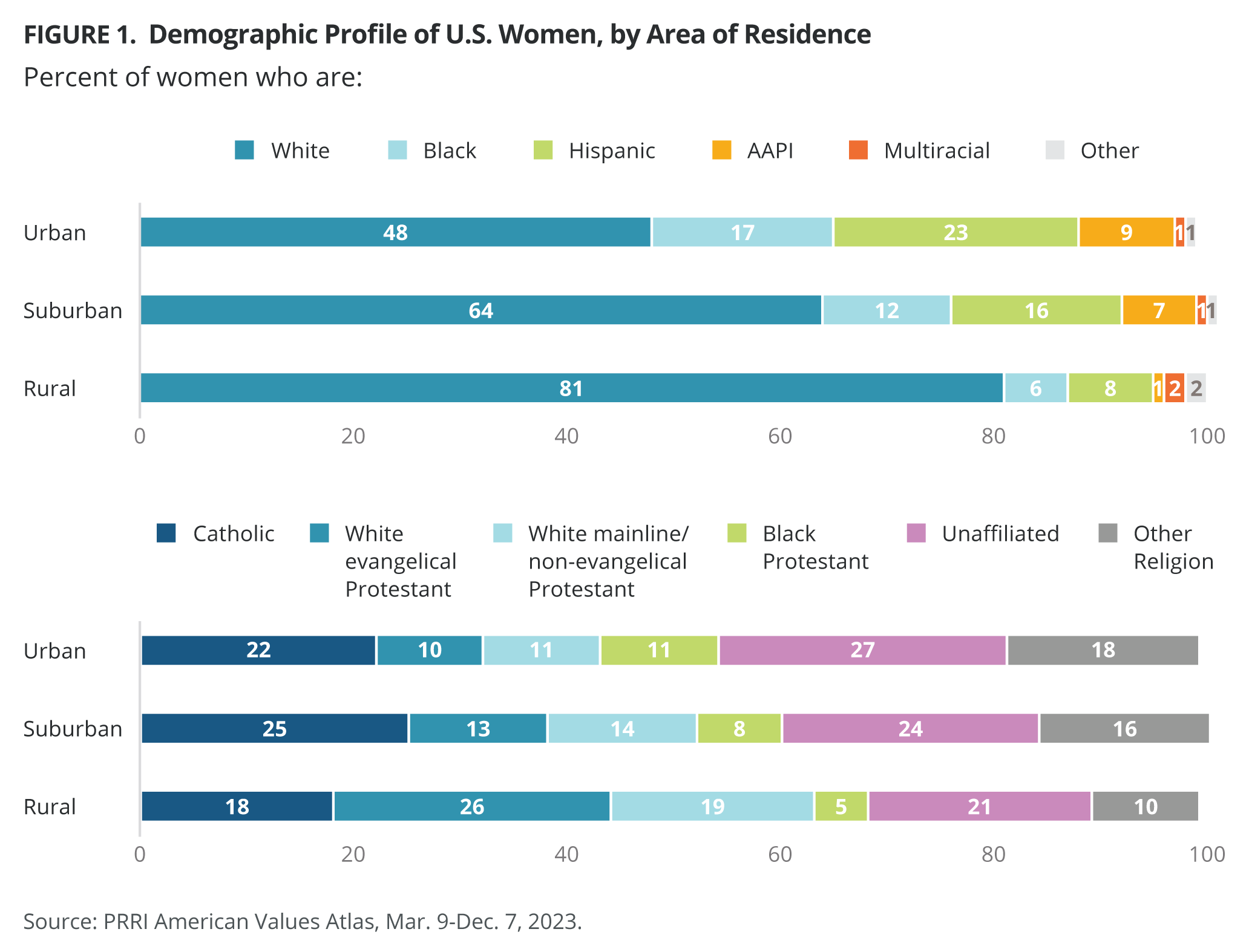
Along partisan lines, a plurality of women living in urban areas identifies as Democratic (44%), over one-quarter (27%) identify as independent, and 16% identify as Republican. In contrast, a plurality of women from rural areas identifies as Republican (43%), one-quarter identify as Democratic (25%), and two in ten identify as independent (21%). The partisan divide among suburban women is less pronounced, with similar percentages identifying as Democratic (31%), independent (30%), and Republican (27%).
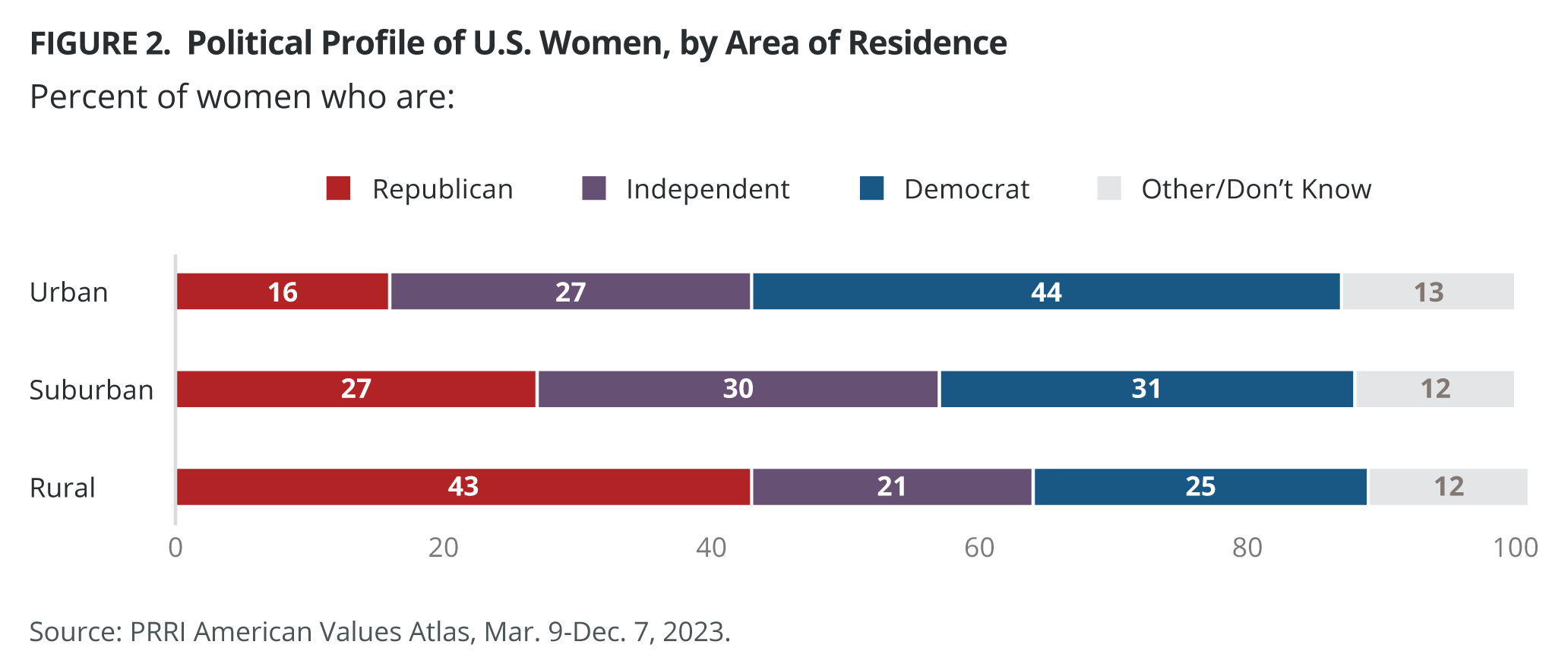
Women’s Attitudes on Abortion Legality
Most women, regardless of area of residence, support the legality of abortion in most or all cases. However, while the majority of women who live in suburban (67%) and urban areas (70%) support the legality of abortion, they are more likely than women who live in rural areas (55%) to say the same.
Support for abortion legality is similar among non-white women across all areas of residence (68% urban, 66% suburban, and 61% rural). In contrast, white women who live in urban areas are the most likely to support the legality of abortion (72%), followed by white suburban women (67%), and white women who live in rural areas (54%).
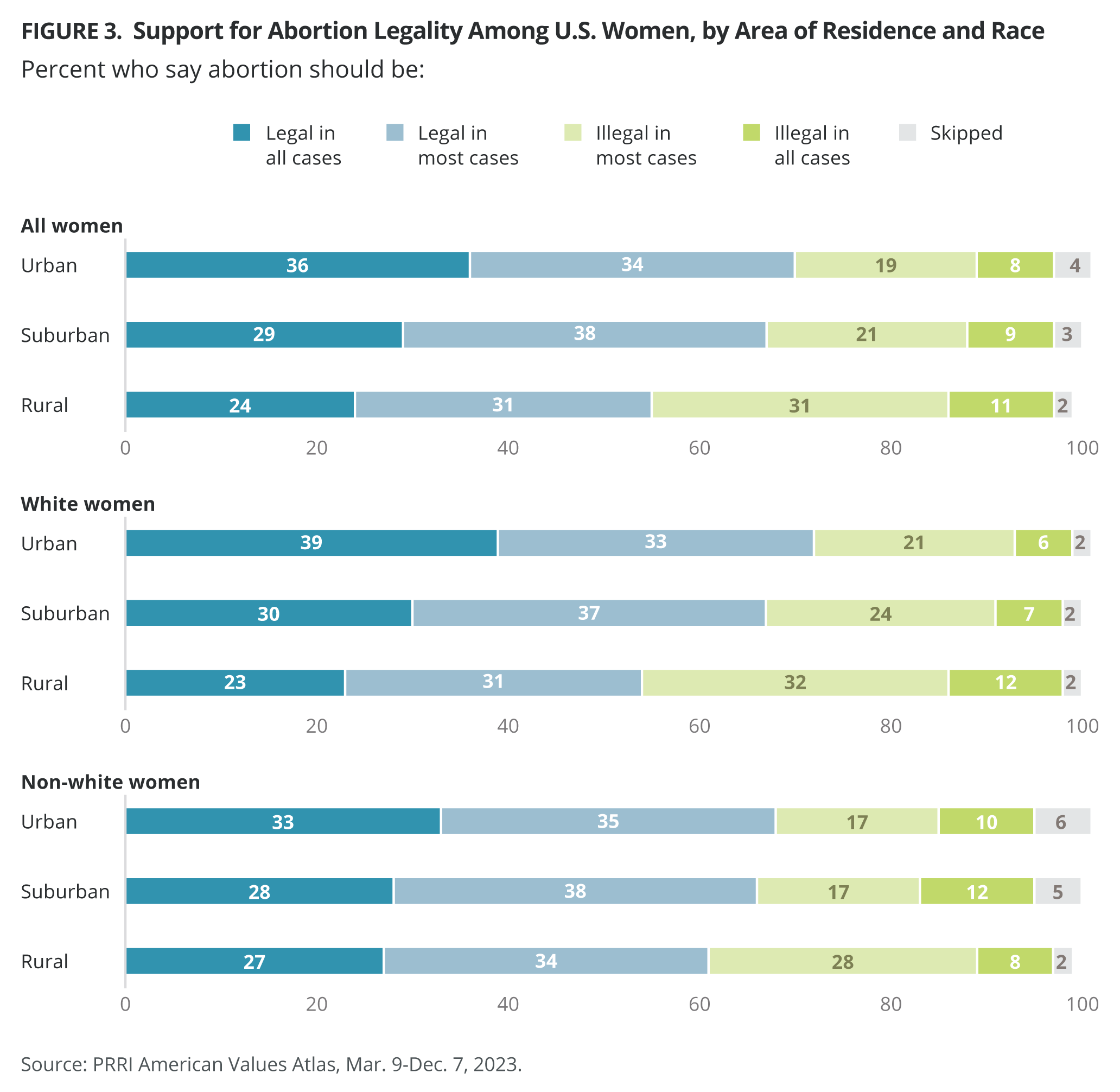
Abortion as a “Litmus Test” Issue
When examining abortion as a political litmus test, there are clear differences among women based on race and area of residence. While more than four in ten women who live in suburban (43%) and urban (44%) areas say they will only vote for a candidate who shares their view on the issue of abortion, 38% of women who live in rural areas say the same.
Similar proportions of non-white women who live in suburban (42%), urban (38%), and rural (34%) areas say they would only vote for a candidate who shares their views on abortion. In contrast, a slim majority of white women who live in urban areas (52%) say they will only vote for a candidate who shares their view on the issue of abortion, compared with 44% of white suburban women and 38% of white women who live in rural areas.
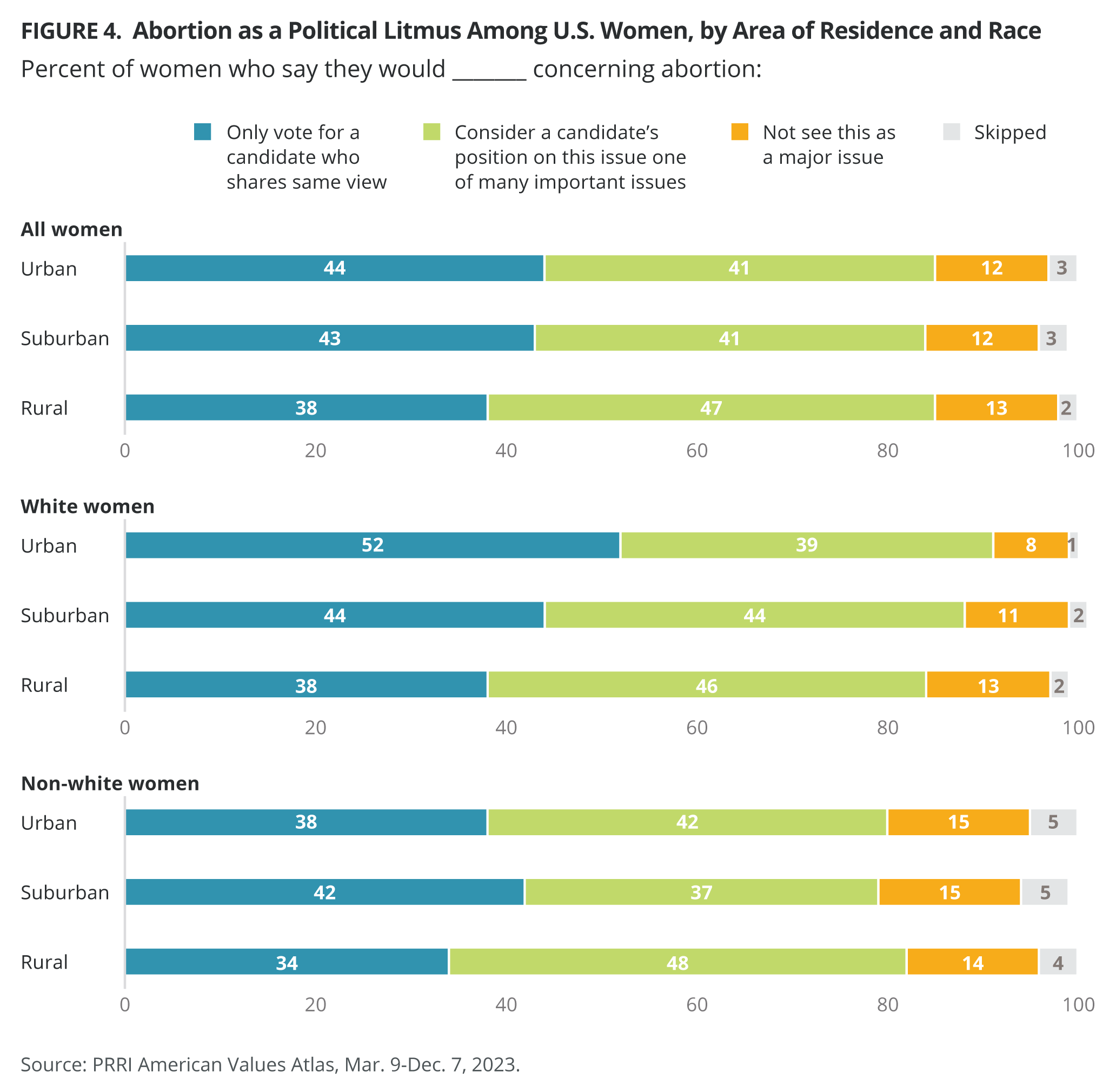
The 2023 PRRI American Values Atlas shows that women’s views on abortion legality influence urban and rural women’s votes differently, while there are no differences among suburban women. In suburban areas, similar percentages of women who say that abortion should be legal (45%) and women who say that abortion should be illegal (42%) say they will only vote for a candidate who shares their views on abortion. In urban areas, women who support the legality of abortion are more likely to vote for a candidate who shares their views than women who support the illegality of abortion (49% vs. 37%), the opposite is true among rural women (33% vs. 45%).
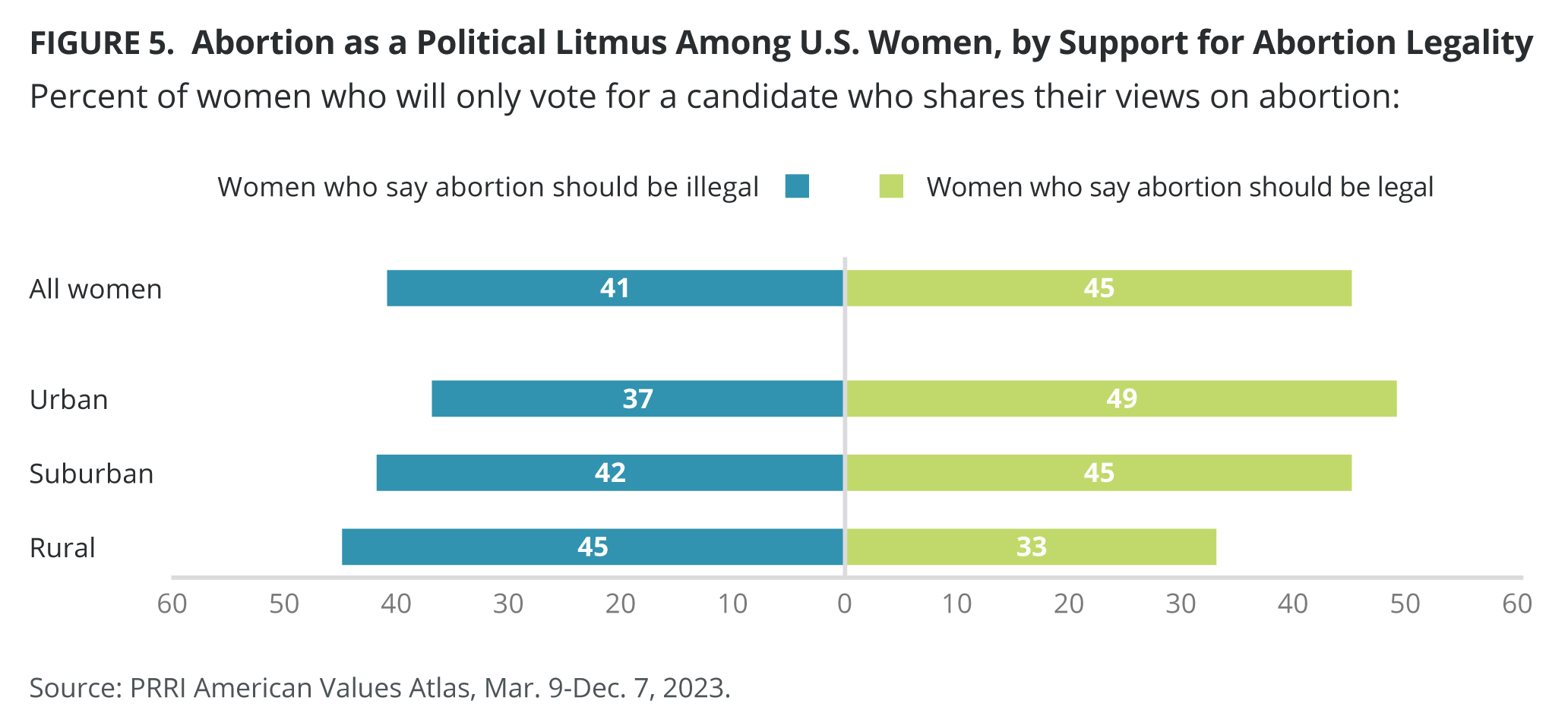
This Spotlight Analysis shows suburban women’s diversity when it comes to race and religion and reveals the saliency of the issue of abortion among this group. For both suburban women who support abortion legality and those who oppose abortion legality, it is clear that the issue of reproductive rights is heavily on their minds and will play a key role in the upcoming presidential election.
[1] For the purposes of this analysis, areas of residence are defined as three categories: urban, suburban, or rural, and are based on self-reported identification.






